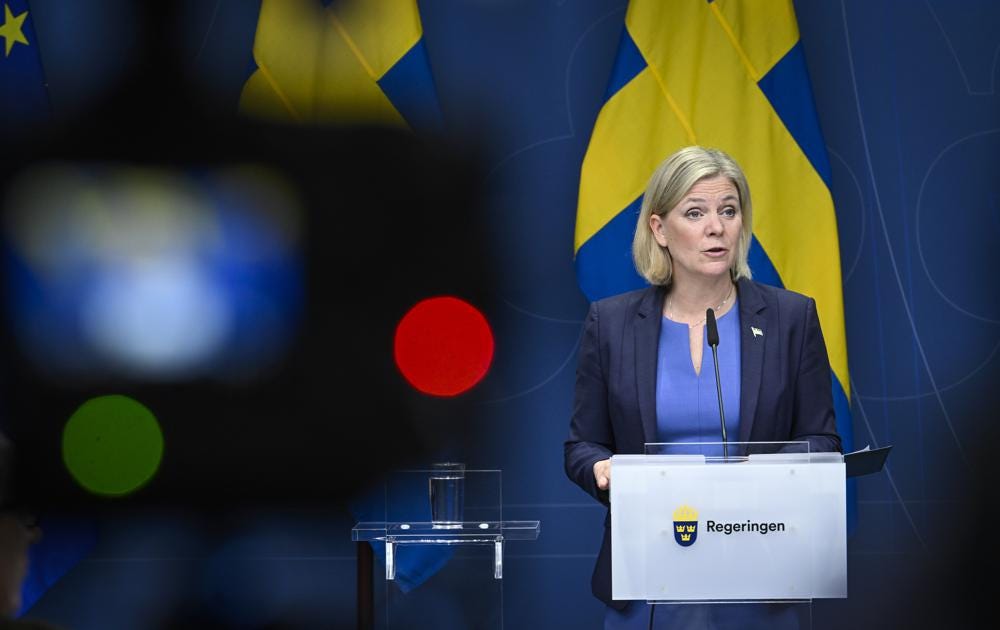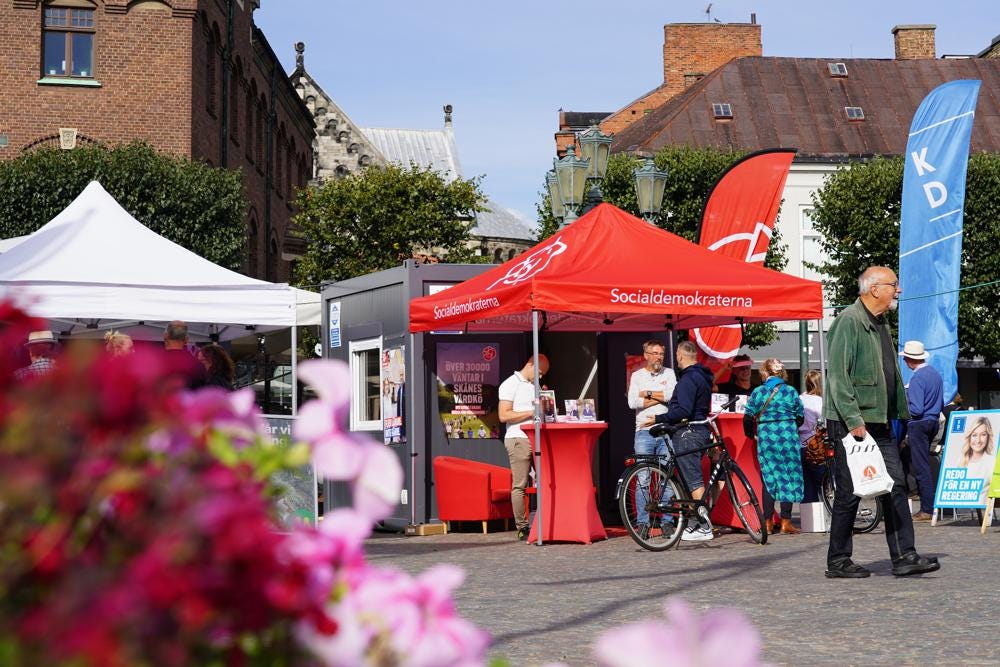Original link: https://sehseh.substack.com/p/f07
On September 14, 2022, Swedish Prime Minister and Social Democrats (Social Democrats) Andersson (Magdalena Andersson) conceded defeat and announced her resignation as prime minister on the 15th. (AP)
Text / Wu Yuanyuan
In the Swedish election campaign, it is rare to hear a candidate emphasizing: “I promise that when I am elected, I will do my duty, be honest and clean,” and so on. In the heat of policy discussions, such unwarranted and contentless propaganda sounds like child’s play. Just like teachers and nurses, officials are a profession, and fulfilling their duties and obligations is the most basic prerequisite. In the short-lived election campaign, it is an unreasonable request for voters to judge which candidate is the most “able”, and it is not the focus of the election.
“Selection of talents and talents” is actually a very old term. Since the feudal era, all regimes in the world have hoped that officials should be “virtuous”. However, no matter how selected and tested for thousands of years, no matter how sharp the eyes of voters are, they are incompetent and corrupt officials. Still endless. The modern democratic system simply presupposes that officials are not virtuous, and sets up independent checks and balances. Coupled with the supervision of the opposition and the guards of the media, it can make officials more afraid of being incompetent and afraid of being incompetent.
In Sweden, people know that talents and talents are not elected, and they also know that the country’s economic prosperity follows the global economic cycle, and it is not something that can be “fighted” within a political party’s tenure. How can Swedes choose a political party if they do not choose talents and talents, and do not fight for the economy?
major announcement
In order to improve the reading experience of readers, “World Walk” will adjust the publication frequency and content of the e-newsletter from 10/31. If you have any suggestions/encouragements/criticisms, please reply to us and tell us✉️
In addition, the telegram channel of walking around the world is about to officially open! Join now, don’t miss the original good articles and the latest news. Subscribe to the private group “Zozou Chat Room” for members. More information will be announced in the near future. Please lock your mailbox!
Walk through the TG channel portal ?
Left-right ideology that emphasizes “resource allocation”
No political party will deliberately set the economy backward, but it often turns a blind eye to the gap between the rich and the poor. Therefore, the Swedish people care more about the “distribution of resources”, that is, “ideology”. The word ideology has many facets, and in Sweden it is mainly used to discuss the use and distribution of social resources.
In general, the ideological left is in favor of high taxes and high welfare, and the government must be large enough to properly allocate resources; the ideological right is in favor of low taxes and more incentives, and the government must be small enough to ensure individual freedom. Each political party in Sweden has a very clear party program and party program, and each student will also learn about the ideology of each party in the compulsory education class.
On the eve of the Swedish elections, people are watching the political opinion presentation on TV. The first question at the presentation is often to ask the representatives of each party to position their party on the ideological spectrum. In addition to forward-looking political opinions, the Swedish media also organizes and reviews for voters what policies and bills the parties have voted for and against in parliament over the past four years. If a party’s platform and actions are too different, it will only lose the trust of voters.
A deeper Swedish-style “worship vote”
Perhaps the most immediate shock to me from watching the Swedish elections is that the Swedish elections are quiet. There are no galas, no huge billboards, no publicity vans with the names of the candidates playing wildly, because these are strictly regulated or prohibited.
But if you take a closer look, you will find that the Swedish election is not “quiet” at all, but the communication between politicians and voters is more precise and in-depth.
The layout of traditional Swedish newspapers is roughly divided into two parts, one is reporting, which focuses on being faithful to the facts and does not carry any personal or newspaper feelings and positions; There is a very important debate section, where people from all walks of life debate openly. When submitting a debate article, you can specify the object of the debate and ask the other party to answer the question. In the debate columns of major Swedish newspapers, you can often see debate articles written by officials from various departments, parliamentarians, and even the prime minister of a country on specific policies. During the election period, it was even more in full swing and exciting.
A month before the election, a political party hut will be erected on the square of each town, and the public can go directly to talk with representatives of each political party. Small-party candidates hold small-scale discussions in families and communities. Each middle school will also hold a mock general election in the school, inviting local representatives of various political parties to the school for debate, and allowing students to take election issues home to discuss with their families.
On September 7, 2022, various parties in Sweden set up tents to promote their political views in the city of Lund for the election. (AP)
Vote for party intent, not personal aura
Sweden’s votes are divided for each political party. For which party you want to vote for, you can put the party’s ballot into the ballot box. In addition to the party name, the ballot also contains a list of candidates nominated by the party. If there is one candidate who is particularly fond of, you can tick his/her name. If there is no tick, the parties will send members to the parliament according to the order on the candidate list.
Swedish voters mostly don’t check specific candidates, but only political parties. Since each candidate is the embodiment of the party’s collective consciousness, it doesn’t really matter who you choose.
In Taiwan’s elections, it seems that it is a hundred times more important for people to remember their names than to know their policy positions. So the candidates went crazy repeating their names and investing like crazy on billboards and flyers. According to people in the printing industry in Taiwan, every election is a grand carnival for the printing industry. According to industry statistics, the amount of money invested in printed matter does have a direct impact on the outcome of the election. These prints usually contain few specific political opinions, mostly Dou Da’s names or black letters attacking opponents. How many precious democratic resources in Taiwan are wasted on expensive and meaningless propaganda activities?
Each democratic country has a different degree of emphasis on individual political charm and the collective consciousness of political parties. Sweden is one extreme, and the United States is another extreme. No matter which one is, vague, wasteful, and disturbing street-sweeping votes can be standardized and Election campaign to avoid. (Finish)
(This article is included in ” I’m Proud to Be an Ordinary Person: I Lived in Sweden and Discovered the Width of Happiness “, reprinted with permission from Commonwealth Magazine, and the article title and text are edited and adapted by the editor of “Walk the World”.)
[Wu Yuanyuan: I saw the happiness of ordinary people in Sweden|A Walk Around the World X Their Actions Series Lectures??]
Wu Yuanyuan’s new book “Being an ordinary person is also proud: I lived in Sweden and found the breadth of happiness”. (Provided by Commonwealth Magazine)
About the Author| Wu Yuanyuan (Graduate of Chinese Department of National Taiwan University, Master of East Asian Institute of Lund University, Sweden, Lecturer of University of Dalarna, Sweden. Now living in Sweden)
The World Walk has important stories you haven’t read yet. We focus on global issues from a gender perspective, complementing stories of dilemma, breakthrough, connection, and change that traditional power perspectives ignore.
Please pay a subscription to become our partner and walk with women around the world.
This article is reprinted from: https://sehseh.substack.com/p/f07
This site is for inclusion only, and the copyright belongs to the original author.


